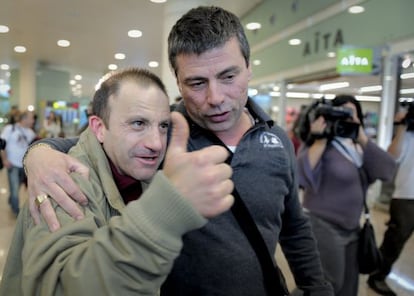“They beat me with a stick and burned me with cigarettes"
Catalan carwash employee wrongly jailed in Italy finally returns home Óscar Sánchez was given 14 years after a drug trafficker used his identity

Óscar Sánchez, a carwash employee from the Catalan town of Montgat, arrived at Barcelona’s El Prat airport on Thursday afternoon to a jubilant reception from friends and family. The previous evening, Sánchez had been released from jail in Italy, where he had served almost two years for a drug-trafficking offense that he did not commit.
“Thank you, thank you,” Sánchez repeated as he gave the thumbs up sign to the dozens of television cameras in attendance.
“He looks like he’s in one piece,” said Sánchez's cousin Juan, who had accompanied him on the flight back from Naples along with other family members. Sánchez, who spent 626 days in prison in Rome and Naples, said he wanted to go home, have a shower, watch a basketball match and drink a beer.
“In Rome I was treated with respect, but in Naples it was a different matter,” Sánchez said. “They beat me with a stick, burned me with cigarettes, kicked me in the chest, shoved my head in a wardrobe and even etched an ‘N’ for Napoli [Naples] into my arm.”
Despite his experience, Sánchez said that he held no ill-feelings toward Italy. “One thing is Italy and another is what happened to me.” He added that the experience taught him to be “a bit more of a man, more disciplined, and to say no to bad people.” Before his arrest, Sánchez said, he would always say “yes” to anything.
Sánchez was arrested as a suspected narcotics trafficker after a Uruguayan mafia member, Marcelo Roberto Marín, had used his documents to carry out various transactions, such as booking hotel rooms. Sánchez’s defense, as well as the Spanish police, always maintained that he had been the victim of identity theft.
Initially, Sánchez said that he had reported his ID as stolen, but later admitted that he had lent it to an acquaintance in exchange for money. He believed that it was going to be used for a series of administrative purposes for a person without legal papers. The Italian authorities based their investigation on the Marín’s movements, which included trips to Italy while using Sánchez’s documentation, and a series of wiretaps of telephone conversations that were made in the Spaniard’s name in which orders were given to a drug-trafficking ring.
During the trial, the prosecution used an expert who said that Sánchez’s voice was the same as that in the recordings, gathered by the Italian police in an investigation into drug trafficking by the Camorra. Sánchez was sentenced to 14 years. Subsequently, the judge in charge of the case ordered further expert analysis of the tapes, which proved that the recorded voice was different to that of Sánchez.
“He deserves for us all to be here,” said Presentación, a family friend. “His nightmare should have ended earlier; justice has taken too long. Such a shy and reserved young man, accused of being a drug trafficker! I still can’t believe it."
Sánchez expressed his gratitude for all the messages of support he had received in prison from his friends and family and many other across Spain.
Before returning to his house on Thursday, Sánchez visited his mother’s grave and walked alone for a while “to think.”
At the airport, hours beforehand, the now-free Sánchez had acted with surprising good humor, given his experience.
“Now I need to find a girlfriend,” he smiled.
Tu suscripción se está usando en otro dispositivo
¿Quieres añadir otro usuario a tu suscripción?
Si continúas leyendo en este dispositivo, no se podrá leer en el otro.
FlechaTu suscripción se está usando en otro dispositivo y solo puedes acceder a EL PAÍS desde un dispositivo a la vez.
Si quieres compartir tu cuenta, cambia tu suscripción a la modalidad Premium, así podrás añadir otro usuario. Cada uno accederá con su propia cuenta de email, lo que os permitirá personalizar vuestra experiencia en EL PAÍS.
¿Tienes una suscripción de empresa? Accede aquí para contratar más cuentas.
En el caso de no saber quién está usando tu cuenta, te recomendamos cambiar tu contraseña aquí.
Si decides continuar compartiendo tu cuenta, este mensaje se mostrará en tu dispositivo y en el de la otra persona que está usando tu cuenta de forma indefinida, afectando a tu experiencia de lectura. Puedes consultar aquí los términos y condiciones de la suscripción digital.








































